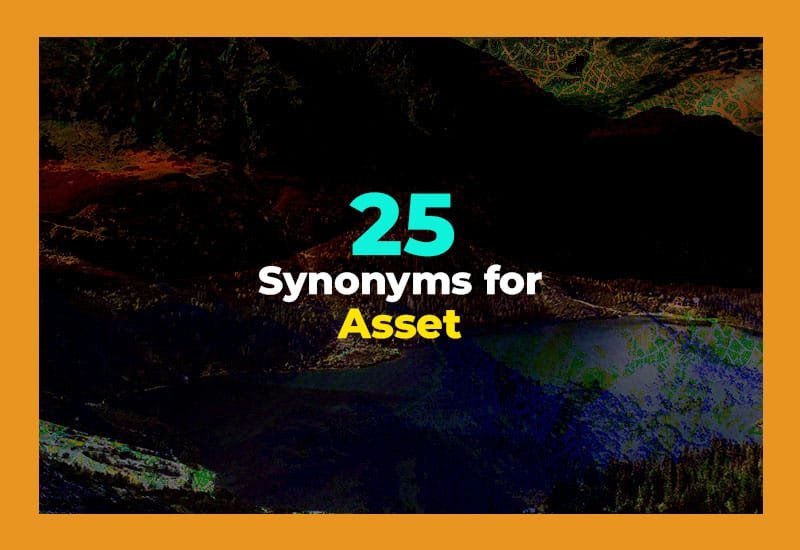You often hear the word “asset” to mean something valuable or useful. But there are many other words that mean the same or close to asset, like resource, benefit, and advantage. Knowing these words helps you express value in different ways. In this article, you'll learn 25 simple and useful synonyms for asset with easy examples to help you understand and use them well.
1. Resource
A resource is anything that helps you do a job or reach a goal. It can be money, people, tools, or natural things like water. For example, water is an important resource for farmers to grow crops. In business, a skilled worker is a valuable resource. You could say, "Our team is a key resource for solving problems." Resources are helpful things that support and improve what you want to do. They can be physical things or skills.
2. Benefit
A benefit is something good that you get from a situation, thing, or action. For example, exercising regularly has many benefits like better health and more energy. When a company offers a new phone plan, the benefit might be lower costs or extra data. You might say, "One benefit of learning English is meeting new people." Benefits are advantages or positive results that make something more useful or valuable.
3. Advantage
An advantage is something that helps you do better or succeed more easily. For example, having a fast computer is an advantage when you work with videos. In sports, being tall can be an advantage for basketball players. You can say, "His experience in sales gave him an advantage in the job interview." Advantages give you a better chance to win or be successful. They are special benefits you have.
4. Property
Property means something that belongs to you, such as a house, car, or land. It is a physical asset that you can use, sell, or rent out. For example, "They bought property near the beach to build a vacation home." Property is important because it usually keeps its value or grows in value over time. Owning property is often a sign of wealth or security. People work hard to buy property as a valuable asset.
5. Possession
Possession means something that you own or have with you. It can be anything from money, clothes, or even ideas. For example, "His most prized possession is his old watch from his grandfather." Possessions show what belongs to you. They can be useful or valuable. You might say, "She lost possession of her phone during the trip." Possessions can be small or large, but they always belong to someone.
6. Strength
Strength means a good quality or skill that helps you do something well. It can be physical power, like lifting heavy objects, or a talent like being patient or creative. For example, "Her strength is in teaching children how to read." Strengths make people or things powerful or useful. When you know your strengths, you can use them to solve problems or get a job done better. Everyone has different strengths.
7. Capital
Capital often means money or goods that you use to start or grow a business. For example, "They needed capital to open a new restaurant." Capital can also mean resources like machines or buildings that help make products. Without capital, it is hard to start a big project or company. People invest capital hoping to get more money back later. Capital is a key asset in business and finance.
8. Treasure
A treasure is something very valuable and often rare or special. It could be gold, jewelry, or something you keep safe because it is precious. For example, "The old map was a treasure to the explorers." Treasure can also mean something important to you personally, like a family photo album. Treasures are worth protecting and can bring happiness or money. People often search for treasures in stories and adventures.
9. Jewel
A jewel is a precious stone like a diamond or ruby. It also means something or someone very valuable and special. For example, "She is the jewel of the company because of her hard work." Jewels shine brightly and are rare, so people prize them highly. When you call a person a jewel, you mean they are important and loved. Jewels can be gifts or signs of wealth.
10. Tool
A tool is an object or idea used to help do a task more easily. It can be a hammer, a computer program, or even a plan. For example, "Email is a tool to communicate quickly with others." Tools make work easier and faster. Without the right tools, many jobs become harder or impossible. You can also say, "Learning new skills is a tool for success." Tools are valuable assets because they help get things done.
11. Aid
Aid means help or support given to someone who needs it. It can be food, money, advice, or medical care. For example, "The government sent aid to families affected by the flood." Aid is important during emergencies or hard times. It makes life easier for people who are struggling. You might also say, "The medicine was an aid in her recovery." Aid is a kind of asset because it improves situations.
12. Boon
A boon is something very helpful or lucky that improves a situation. It is like a gift or blessing that comes at the right time. For example, "The new road was a boon for the village, making travel easier." Boons often bring benefits that last a long time. People feel thankful for boons because they make life better or easier. You can say, "Good weather was a boon for the farmers this year."
13. Blessing
A blessing is something good that brings happiness or protection. It can be a kind action, a gift, or good luck. For example, "Having supportive friends is a blessing in tough times." Blessings are often seen as gifts from a higher power or lucky events. People say, "It was a blessing to find a job so quickly." Blessings make people feel thankful and happy.
14. Support
Support means help or encouragement you give or receive. It can be emotional, physical, or financial help. For example, "Her family gave her support when she was sick." Support makes hard times easier and gives strength to continue. You can say, "The teacher's support helped me pass the exam." Support is a valuable asset because it helps people grow and succeed.
15. Gift
A gift is something you give to someone without expecting anything in return. It can be an object, skill, or even time. For example, "She gave me a book as a gift." Gifts are special and show kindness. Sometimes, a talent or skill is called a gift, like "He has a gift for music." Gifts add value and joy to life, making them important assets.
16. Talent
Talent is a natural skill or ability that helps you do something well. It can be singing, drawing, or sports. For example, "Her talent for painting won many awards." Talents are valuable because they can lead to success or happiness. You might say, "Everyone has a special talent to share." Developing your talents is important for growth and achievement.
17. Skill
A skill is something you learn to do well through practice. It can be cooking, writing, or fixing cars. For example, "He has a skill in programming computers." Skills are important assets because they help you get jobs and solve problems. You can say, "Learning new skills improves your chances of success." Skills grow with effort and make you more valuable.
18. Edge
An edge is a slight advantage or something that helps you do better than others. For example, "Her quick thinking gave her an edge in the competition." Having an edge means you are ahead or have a benefit. It can be knowledge, skill, or a special quality. You can say, "Experience gave him the edge in negotiations." An edge helps you win or be more successful.
19. Value
Value means how important or useful something is. It can be money worth or emotional importance. For example, "The value of this painting has increased over time." You might say, "Honesty has great value in friendships." Value shows how much something is respected or needed. It is a key idea when talking about assets.
20. Equity
Equity is the ownership value you have in something, usually property or a business. For example, "She built equity in her house by paying off the loan." Equity means your share or part of something that grows in worth. It is an important financial asset because it can be used for loans or selling. People work to increase equity to build wealth.
21. Holding
A holding is something you own, especially investments like stocks or property. For example, "The company's holdings include many valuable buildings." Holdings are assets that add to your wealth or power. You can say, "He has holdings in several businesses." Holdings can change in value but are usually important financial assets.
22. Stock
Stock means shares or ownership in a company. It is a financial asset you can buy or sell. For example, "She bought stock in a technology company." Stocks can grow in value and pay money called dividends. They are important assets for investors. You can say, "The stock market went up today." Stocks show part ownership and can bring profit.
23. Bond
A bond is a loan you give to a company or government that pays you interest. It is a financial asset that is usually safer than stocks. For example, "He bought bonds to save money for the future." Bonds help governments and companies get money for projects. Investors use bonds as assets to get steady income. You might say, "Bonds are good for low-risk investments."
24. Good
A good is a physical item that you can buy, sell, or use. For example, "The store sells goods like clothes and food." Goods are assets because they have value and can be traded. You can say, "Durable goods last a long time." Goods are important in business and daily life as useful items.
25. Worth
Worth means the value or importance of something. For example, "This necklace has great worth because it is old and rare." You can say, "Her advice is worth a lot to me." Worth shows how much something is respected, loved, or useful. It helps decide if something is an asset or not.

Final Thoughts
Learning different synonyms for asset helps you speak and write better. Words like resource, benefit, and capital show many ways to describe value. Each word has its own special meaning and use. Using the right synonym makes your message clear and interesting. Keep practicing these words to understand and remember them. This way, you can talk about important things more easily and clearly.









